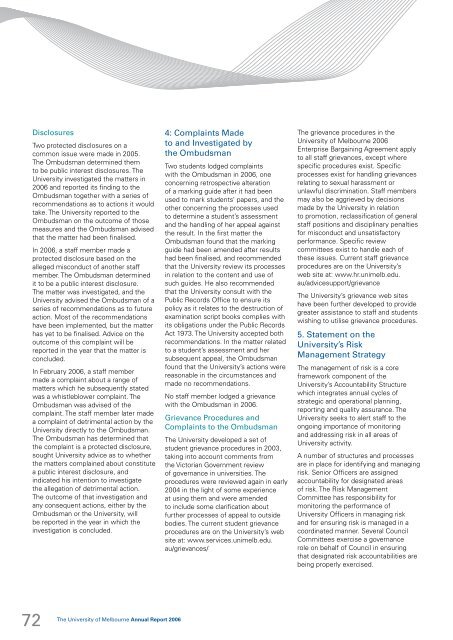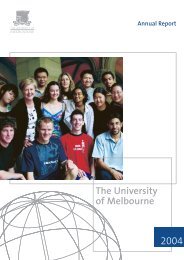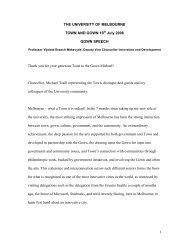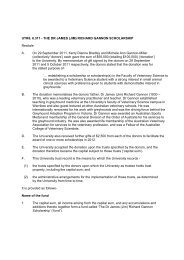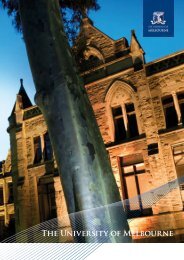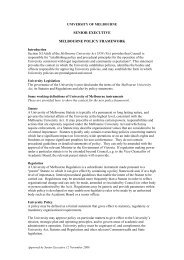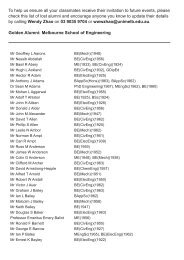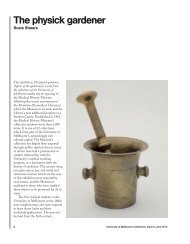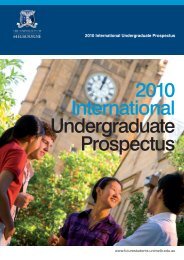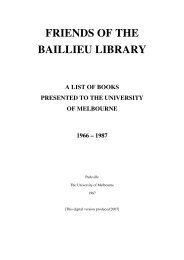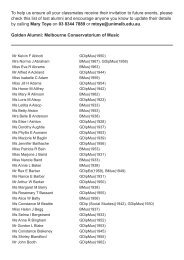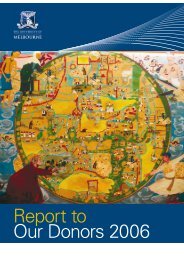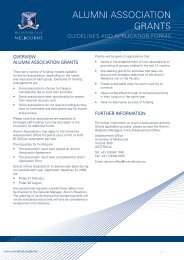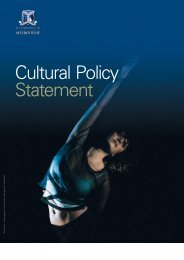annual report/2006 - University of Melbourne
annual report/2006 - University of Melbourne
annual report/2006 - University of Melbourne
Create successful ePaper yourself
Turn your PDF publications into a flip-book with our unique Google optimized e-Paper software.
Disclosures<br />
Two protected disclosures on a<br />
common issue were made in 2005.<br />
The Ombudsman determined them<br />
to be public interest disclosures. The<br />
<strong>University</strong> investigated the matters in<br />
<strong>2006</strong> and <strong>report</strong>ed its finding to the<br />
Ombudsman together with a series <strong>of</strong><br />
recommendations as to actions it would<br />
take. The <strong>University</strong> <strong>report</strong>ed to the<br />
Ombudsman on the outcome <strong>of</strong> those<br />
measures and the Ombudsman advised<br />
that the matter had been finalised.<br />
In <strong>2006</strong>, a staff member made a<br />
protected disclosure based on the<br />
alleged misconduct <strong>of</strong> another staff<br />
member. The Ombudsman determined<br />
it to be a public interest disclosure.<br />
The matter was investigated, and the<br />
<strong>University</strong> advised the Ombudsman <strong>of</strong> a<br />
series <strong>of</strong> recommendations as to future<br />
action. Most <strong>of</strong> the recommendations<br />
have been implemented, but the matter<br />
has yet to be finalised. Advice on the<br />
outcome <strong>of</strong> this complaint will be<br />
<strong>report</strong>ed in the year that the matter is<br />
concluded.<br />
In February <strong>2006</strong>, a staff member<br />
made a complaint about a range <strong>of</strong><br />
matters which he subsequently stated<br />
was a whistleblower complaint. The<br />
Ombudsman was advised <strong>of</strong> the<br />
complaint. The staff member later made<br />
a complaint <strong>of</strong> detrimental action by the<br />
<strong>University</strong> directly to the Ombudsman.<br />
The Ombudsman has determined that<br />
the complaint is a protected disclosure,<br />
sought <strong>University</strong> advice as to whether<br />
the matters complained about constitute<br />
a public interest disclosure, and<br />
indicated his intention to investigate<br />
the allegation <strong>of</strong> detrimental action.<br />
The outcome <strong>of</strong> that investigation and<br />
any consequent actions, either by the<br />
Ombudsman or the <strong>University</strong>, will<br />
be <strong>report</strong>ed in the year in which the<br />
investigation is concluded.<br />
4: Complaints Made<br />
to and Investigated by<br />
the Ombudsman<br />
Two students lodged complaints<br />
with the Ombudsman in <strong>2006</strong>, one<br />
concerning retrospective alteration<br />
<strong>of</strong> a marking guide after it had been<br />
used to mark students’ papers, and the<br />
other concerning the processes used<br />
to determine a student’s assessment<br />
and the handling <strong>of</strong> her appeal against<br />
the result. In the first matter the<br />
Ombudsman found that the marking<br />
guide had been amended after results<br />
had been finalised, and recommended<br />
that the <strong>University</strong> review its processes<br />
in relation to the content and use <strong>of</strong><br />
such guides. He also recommended<br />
that the <strong>University</strong> consult with the<br />
Public Records Office to ensure its<br />
policy as it relates to the destruction <strong>of</strong><br />
examination script books complies with<br />
its obligations under the Public Records<br />
Act 1973. The <strong>University</strong> accepted both<br />
recommendations. In the matter related<br />
to a student’s assessment and her<br />
subsequent appeal, the Ombudsman<br />
found that the <strong>University</strong>’s actions were<br />
reasonable in the circumstances and<br />
made no recommendations.<br />
No staff member lodged a grievance<br />
with the Ombudsman in <strong>2006</strong>.<br />
Grievance Procedures and<br />
Complaints to the Ombudsman<br />
The <strong>University</strong> developed a set <strong>of</strong><br />
student grievance procedures in 2003,<br />
taking into account comments from<br />
the Victorian Government review<br />
<strong>of</strong> governance in universities. The<br />
procedures were reviewed again in early<br />
2004 in the light <strong>of</strong> some experience<br />
at using them and were amended<br />
to include some clarification about<br />
further processes <strong>of</strong> appeal to outside<br />
bodies. The current student grievance<br />
procedures are on the <strong>University</strong>’s web<br />
site at: www.services.unimelb.edu.<br />
au/grievances/<br />
The grievance procedures in the<br />
<strong>University</strong> <strong>of</strong> <strong>Melbourne</strong> <strong>2006</strong><br />
Enterprise Bargaining Agreement apply<br />
to all staff grievances, except where<br />
specific procedures exist. Specific<br />
processes exist for handling grievances<br />
relating to sexual harassment or<br />
unlawful discrimination. Staff members<br />
may also be aggrieved by decisions<br />
made by the <strong>University</strong> in relation<br />
to promotion, reclassification <strong>of</strong> general<br />
staff positions and disciplinary penalties<br />
for misconduct and unsatisfactory<br />
performance. Specific review<br />
committees exist to handle each <strong>of</strong><br />
these issues. Current staff grievance<br />
procedures are on the <strong>University</strong>’s<br />
web site at: www.hr.unimelb.edu.<br />
au/advicesupport/grievance<br />
The <strong>University</strong>’s grievance web sites<br />
have been further developed to provide<br />
greater assistance to staff and students<br />
wishing to utilise grievance procedures.<br />
5. Statement on the<br />
<strong>University</strong>’s Risk<br />
Management Strategy<br />
The management <strong>of</strong> risk is a core<br />
framework component <strong>of</strong> the<br />
<strong>University</strong>’s Accountability Structure<br />
which integrates <strong>annual</strong> cycles <strong>of</strong><br />
strategic and operational planning,<br />
<strong>report</strong>ing and quality assurance. The<br />
<strong>University</strong> seeks to alert staff to the<br />
ongoing importance <strong>of</strong> monitoring<br />
and addressing risk in all areas <strong>of</strong><br />
<strong>University</strong> activity.<br />
A number <strong>of</strong> structures and processes<br />
are in place for identifying and managing<br />
risk. Senior Officers are assigned<br />
accountability for designated areas<br />
<strong>of</strong> risk. The Risk Management<br />
Committee has responsibility for<br />
monitoring the performance <strong>of</strong><br />
<strong>University</strong> Officers in managing risk<br />
and for ensuring risk is managed in a<br />
coordinated manner. Several Council<br />
Committees exercise a governance<br />
role on behalf <strong>of</strong> Council in ensuring<br />
that designated risk accountabilities are<br />
being properly exercised.<br />
72<br />
The <strong>University</strong> <strong>of</strong> <strong>Melbourne</strong> Annual Report <strong>2006</strong>


